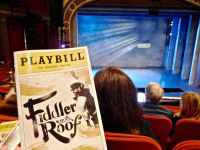Today’s global conflicts look eerily similar to events from the past when viewed from the right lens. It is difficult not to empathize with the millions of families displaced from countries in the Middle East due to rising political conflict and imminent threats from ISIS. In a similar fashion, the Russian Revolution, which toppled the Russian Empire and introduced communism into the newly united Soviet Union, affected millions of citizens residing in small villages, driving them out of the country. Barlett Sher’s revival of Fiddler on the Roof examines how the rise of communism uproots the lives of a small Jewish community in Russia.
Fiddler on the Roof has a history richer than many other productions currently on the Great White Way, as one of the most beloved musicals of all time. Written by Jerry Bock and Sheldon Harnick, it originally premiered on Broadway over 50 years ago. Harold Prince directed and the comedic icon Zero Mostel starred. The show spawned numerous revivals since then, including the one I recently decided to see playing at the Broadway Theatre in Manhattan.
Fiddler on the Roof tells the story of Tevye (Danny Burstein), a poor Jewish dairyman living with his wife Golde (Jessica Hecht) and five daughters in a shtetl (small Jewish town) called Anatevka in pre-revolutionary Russia. Tradition reigns supreme in Anatevka, as sung in the brash opening number. In accordance with the Jewish faith, a matchmaker must pair up a man and woman of age to be married, which must be approved by the woman’s father. Tevye’s three eldest daughters, Tzeitel (Alexandra Silber), Hodel (Samantha Massel) and Chava (Melanie Moore), eagerly await their matches from Yente (Alix Korey), the local matchmaker. Tzeitel warns her younger sisters that, given their poor socio-economic status, they will likely receive a man from a low social tier. Tzeitel is dismayed when Yente arranges a match between her and the old widowed butcher, Lazar Wolf (Adam Dannheisser). She is in love with the poor tailor, Motel Kamzoil (Adam Kantor). They ask Tevye’s permission to get married, arguing that he must do right by his daughter. He accepts, and they are married. Next, Hodel and the revolutionary student Perchik (Ben Rappaport) decide to marry.
When Perchik is arrested by the Czar’s troops and sent to Siberia, Hodel decides to leave her family and homeland and travel to Siberia to be with Perchik. When his third daughter Chava decides to marry a Christian named Fyedka (Nick Rehberger), Tevye does not accept this and considers her dead. Exiled by the Bolsheviks, Tevye, Golde and their two youngest daughters ostensibly end their ordeal by leaving Anatevka for America, “far from the home they love.”
The role of Tevye is as demanding as it sounds. Whoever is playing him must strike a perfect balance between self-depreciating humor and a desperate need to fulfill his cultural responsibility. He constantly pleads to an apathetic god to make all his trials work out, from his headstrong daughters to his declining wealth. Danny Burstein does a fine job at guiding the audience through Tevye’s struggle to adhere to his morals in turbulent times. Through his acting choices, Burstein makes this goal overwhelmingly clear, a goal that is likely shared by all of the refugees fleeing the Middle East today.
Elegantly designed, warmly acted and beautifully played and sung, Sherr’s production of Fiddler on the Roof accomplishes what few shows today can: it makes its audience laugh whilst tugging at its heartstrings. It is a show that makes you ponder about the state of the world, especially in today’s troubled times. The destiny of Tevye and his family is left unknown, just as millions of Middle Eastern refugees are unaware of what lies ahead. However, just as it is in Fiddler, they use their faith as a moral compass to guide them to a better place.





